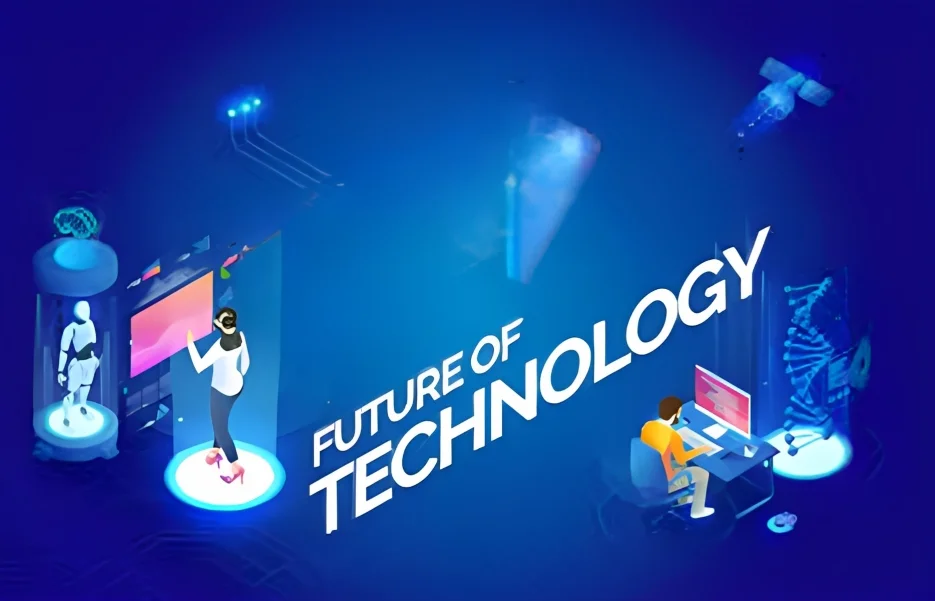The future of technology: what to expect in 2023 and beyond
Technology is advancing quickly and has a significant impact on how we live. Technology’s future looks exciting, from virtual reality to artificial intelligence. We may anticipate significant developments in robots, extended reality, self-driving automobiles, and other fields of technology in 2023 and beyond. These developments will introduce both positive and harmful elements. For instance, self-driving cars may make the roads safer, while virtual reality may enable us to interact with the world around us in completely novel ways. Technology is in an exciting phase right now, and the future holds many exciting possibilities. What the technology of the future contains is merely a matter of conjecture.

What to Expect in 2023 and Beyond
We can anticipate significant developments in robotics, augmented reality, self-driving automobiles, and other fields of technology in 2023. Roads might be made safer by self-driving cars, virtual reality could enable entirely new interactions with the environment, and robotics could enhance manufacturing and medical care. Synthetic intelligence, meanwhile, has the potential to change our daily lives and provide new ethical dilemmas. What technology will ultimately become is beyond our comprehension. Autonomous vehicles may improve mobility and lower the number of accidents related to human error. Additionally, they could increase carsharing, lower the price of licenses, and improve access for those who are unable to drive for valid reasons. Extensive information may enable us to engage with the environment.
Imagine walking down the street, glancing at a building, and having the ability to see inside it as if it were open. According to experts, augmented reality has the potential to transform a variety of elements of our daily lives, including education, entertainment, and healthcare. Manufacturing and medical care could benefit from robotics. There are already some surgical procedures that involve robot assistance, and in the future, robots might be able to handle more difficult procedures. Meanwhile, robots can carry out some production jobs that are challenging for humans.
Artificial Intelligence (AI): Revolutionizing Industries
All industries could experience a change thanks to AI. AI-powered solutions are positioned to revolutionize every aspect of our lives and work, from healthcare and finance to manufacturing and transportation. Massive amounts of data can be analyzed by machine learning algorithms to produce insightful results, automate procedures, and improve decision-making. AI in healthcare can help in disease diagnosis, creating individualized treatment regimens, and even forecasting patient outcomes. AI algorithms in finance can spot fraudulent activity, offer individualized financial guidance, and improve investment plans. There are countless possibilities, and as AI develops, it will surely have a significant impact on how various businesses develop in the future.
Internet of Things (IoT): Connecting the World
Globally connecting systems, devices, and sensors, the IoT is quickly growing. The continuous communication and data sharing made possible by this network’s connections increase productivity, safety, and convenience. IoT-enabled smart homes may automate a variety of operations, like regulating the temperature and lighting, controlling home security, and even placing grocery orders. IoT systems in transportation can improve traffic flow, track vehicle performance, and allow connected cars to speak with one another, increasing road safety and easing congestion. Additionally, the IoT is essential for building smart cities, where data-driven insights improve resource management, urban planning, and quality of life in general.
5G Technology: Transforming Connectivity
With the introduction of 5G technology, a connection is expected to be completely transformed thanks to increased network capacity, quicker download and upload speeds, and lower latency. This development will open up new opportunities in fields like remote surgery, driverless vehicles, and immersive virtual reality. We may anticipate super-fast mobile internet speeds, flawless HD content streaming, and enhanced communication possibilities with 5G. The enhanced bandwidth and reduced latency of 5G networks will open the door for innovations that call for high-speed connectivity and real-time data processing, ultimately revolutionizing many industries and extending new media for contact and cooperation.
Automation and Robotics: Changing the Workforce
The workforce has already been changed by automation and robotics, and this trend is predicted to continue. While some processes and professions might be automated, there will also be new opportunities that call for human abilities like creativity, emotional intelligence, and critical thinking. Cobots, or collaborative robots, can collaborate with people to increase productivity and efficiency in sectors like manufacturing and logistics. Automation technology can also streamline monotonous operations, freeing up human workers to concentrate on higher-value jobs. People have the chance to upskill and reskill themselves to prepare for the occupations of the future because of this change in the labor dynamics.
Augmented Reality (AR) and Virtual Actuality (VR): Enhancing Knowledge
The way we experience the world around us is likely to change as a result of AR and VR technologies. Digital information is superimposed on the physical environment in augmented reality, which improves our awareness of and engagement with our surroundings. On the other side, virtual reality submerges users in a synthetic setting, producing a wholly fake but remarkably lifelike experience. These technologies have uses in a variety of fields, including education, training, and entertainment as well as gaming. While they provide accurate simulations and hands-on learning opportunities in education and training, augmented reality (AR) and virtual reality (VR) in the gaming business provide more immersive and participatory gameplay. The future of entertainment, communication, and education will surely be influenced by AR and VR technologies as they develop.
Blockchain: Advancing Security and Trust
Blockchain technology, which is most often connected to digital currencies like Bitcoin, has far-reaching consequences. Blockchain is fundamentally a secure, decentralized digital ledger that keeps track of transactions while ensuring transparency and immutability. Supply chain management, banking, healthcare, and other industries could all be completely transformed by this technology. Businesses may improve security, streamline procedures, and promote participant confidence by utilizing blockchain. Blockchain, for instance, can offer a transparent record of the origin, quality, and movement of products in supply chain management, minimizing fraud and ensuring ethical sourcing. Similar to how it helps speed up transactions in other industries, blockchain can do the same in banking, cutting out middlemen and saving money.
Biotechnology and Genetic Engineering: Shaping Healthcare
Genetic engineering and biotechnology developments have the potential to completely change the way healthcare is provided. Based on a person’s genetic profile, personalized medicine offers more precise diagnoses and customized treatments. Unprecedented gene modification accuracy is made possible by genetic engineering tools like CRISPR-Cas9, opening the door to potential treatments for hereditary illnesses. Additionally, biotechnology is essential in the development of novel medicines with the potential to revolutionize the therapeutic landscape, such as gene therapies and immunotherapies. These developments have the potential to significantly enhance patient outcomes, increase disease prevention, and deepen our understanding of the human body.
Quantum Computing: Unleashing Computational Power
The goal of quantum computing is to use quantum physics to carry out computations that are currently impossible for classical computers. Although technology is still in its infancy, quantum computing has the power to completely alter encryption, optimization issues, and scientific inquiry. Quantum computers use qubits, or quantum bits, which can exist in several states at once, enabling parallel processing and exponential computational capability. Quantum computers may solve challenging issues in fields like drug research, weather forecasting, and logistical system optimization thanks to their enormous processing power. Researchers and business leaders are aggressively researching the technology’s potential applications and pushing the envelope of what is feasible even though it is still in the early stages of development.
Renewable Energy: Promoting Sustainability
The accelerated development of renewable energy sources has been prompted by the urgent need to combat climate change and lessen our dependency on fossil fuels. Efficiency and cost-effectiveness have significantly improved for several types of energy, particularly solar and wind energy. We may anticipate a rise in the adoption and integration of renewable energy technologies into our energy systems as they continue to develop. Renewable energy sources will become even more dependable and stable as energy storage technologies like batteries and hydrogen fuel cells advance. The switch to renewable energy has advantages for the environment as well as economic growth, job creation, and energy independence.
Smart Cities: Creating Efficient Urban Environments
The idea of “smart cities” involves integrating technology into urban infrastructure to produce settings that are effective, sustainable, and livable. Smart cities may optimize resource management, enhance transportation systems, improve public safety, and foster citizen involvement by utilizing IoT sensors, data analytics, and connectivity. Smart traffic management systems, for instance, can dynamically modify traffic signals based on current traffic circumstances, easing congestion and enhancing air quality. Energy management systems in smart buildings can optimize energy use and lower carbon emissions. Cities that are more robust, environmentally sustainable, and attentive to the needs of their citizens are the goals of these technological breakthroughs.
Cybersecurity: Safeguarding Digital Assets
A strong cybersecurity strategy is essential as technology becomes more widespread in our daily lives. Risks to people, companies, and governments arise from the sophistication and prevalence of cyber threats. In the digital age, it is crucial to safeguard private information, secure digital assets, and safeguard sensitive data. Protecting against cyberattacks will need the use of cybersecurity tools including intrusion detection systems, multi-factor authentication, and improved encryption methods. To reduce risks, it will also be essential to spread knowledge about cybersecurity best practices and encourage a culture of cybersecurity hygiene. Cybersecurity will be a persistent concern as technology develops, requiring regular monitoring and preventive actions to keep one step ahead of thieves.
Edge Computing: Accelerating Data Processing
Processing data closer to its source is essential due to the data’s exponential increase. Edge computing reduces latency and enables real-time analysis by bringing computation and data storage closer to the devices and sensors generating the data. This technology is especially important in applications like autonomous vehicles, industrial automation, and smart infrastructure that demand low latency and high responsiveness. Organizations may reduce bandwidth utilization, improve data privacy, and enable quicker decision-making by processing data at the edge. Organizations can benefit from real-time data analysis while reducing their dependency on centralized cloud infrastructure thanks to edge computing.
Autonomous Vehicles: Redefining Transportation
Drones and autonomous vehicles, such as self-driving cars and trucks, have the potential to completely change the transportation sector. The promise of safer roads, less traffic, and greater mobility is what autonomous vehicles hold out as a result of developments in AI, sensors, and networking. Self-driving vehicles can navigate roadways, avoid hazards, and make split-second judgments by utilizing real-time data, sensors, and AI algorithms. Autonomous drones and robots can automate delivery processes in the logistics sector, cutting costs and improving productivity. However, the widespread use of autonomous vehicles also brings up moral and legal issues that must be resolved to guarantee public acceptability and safety.
E-commerce and Digital Payments: Transforming Commerce
We now buy and sell goods and services in a different ways as a result of the growth of e-commerce and digital payments. Online shopping’s convenience and safe digital payment options have completely changed the retail sector. Reaching clients globally and facilitating smooth transactions has become crucial for both huge e-commerce platforms and small enterprises. The transition toward digital commerce has also been expedited by developments in technology like mobile wallets, cryptocurrencies, and contactless payments. We may anticipate improvements that improve the overall customer experience as e-commerce continues to develop, such as tailored recommendations, augmented reality shopping, and frictionless checkout procedures.
Health Tech: Revolutionizing Healthcare Delivery
Innovations in health technology have the power to completely transform the way healthcare is delivered, making it more efficient, accessible, and personalized. With the use of telemedicine, patients can consult with medical professionals at a distance, lowering access obstacles and facilitating prompt medical consultations. People who use wearable technology, such as smartwatches and fitness trackers, have access to real-time health information, enabling them to take charge of their health. Remote patient monitoring enhances the management of chronic diseases and post-operative care by allowing medical practitioners to remotely monitor patients’ vital signs and health problems. These developments in medical technology have the potential to change how we get healthcare, improve patient outcomes, and lower healthcare costs.
conclusion
Technology has the enormous potential to significantly impact how we live our lives. The possibilities are endless, ranging from breakthroughs in renewable energy and healthcare technology to the revolutionary power of AI and IoT. Realizing technology’s full potential in building a better future will depend on accepting these developments together with the appropriate safety measures and ethical considerations. So let’s continue to be inquisitive, inventive, and adaptive as we go forth into the technological future, where limitless opportunities lie ahead.


